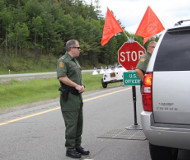3/15/2018
Feds Try To Restore Confidence In Drugged Driver SurveyGovernment Accountability Office report concludes changes to controversial roadside drug testing program are good enough.

The National Highway Traffic Safety Administration (NHTSA) is desperately trying to rehabilitate its controversial roadside drug testing program. On Monday, the Government Accountability Office (GAO) issued a report outlining the reforms that NHTSA has proposed to address motorist concerns with the National Roadside Survey.
The last survey in 2014 relied upon police roadblocks that forced motorists to stop against their will so that they could be encouraged to "voluntarily" take a drug test. Passive alcohol sensors were also used to search vehicles for traces of alcohol without the motorist's consent. The heavy-handed tactics triggered a lawsuit and the ire of congressional lawmakers who banned the use of federal funding for any future surveys.
"While participation in the survey is random, voluntary, and compensated, civil libertarians have raised concerns about the presence of uniformed officers at the survey sites as the driving public may confuse survey sites with mandatory law enforcement checkpoints," the Senate report on the funding ban explained. "In addition, passive and active collection of blood and saliva as part of the testing process has raised privacy concerns."
Congress directed NHTSA and the GAO to report on how these concerns would be addressed. The government watchdog agency noted that the new survey methodology NHTSA implemented in 2014 was already sufficiently different from the use of police roadblocks to satisfy industry stakeholders. After the public outcry, NHTSA began using researchers to direct traffic and use police officers "in the background." Participants would be paid $10 to provide a saliva sample and $50 to have their blood drawn. Drivers who refused to go along with this were still asked to give a breath sample before leaving.
"Our assessment of this methodology found that changes related to the use of law enforcement officers, among others, addressed perceived concerns raised by some drivers during the most recent survey regarding voluntary participation and the privacy of drivers," GAO analyst Susan Fleming wrote.
GAO came to this conclusion after seeking the view of stakeholders, which included agencies and organizations involved in enforcement, such as the Office of National Drug Control Policy and the Society of Forensic Toxicologists. It also considered the views of AAA, a leading insurance company that profits from traffic tickets and driving-related arrests.
"None of the researchers or public safety stakeholders we spoke with had concerns about the role of law enforcement or about privacy protections," Fleming explained.
The US House of Representatives voted to continue banning funding of the National Roadside Survey in September. A copy of GAO's new report is available in a 200k PDF file at the source link below.


